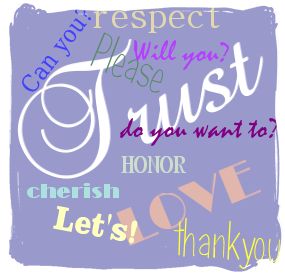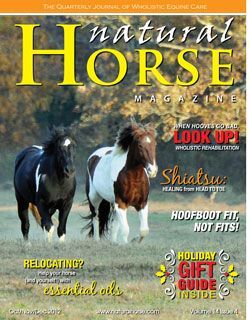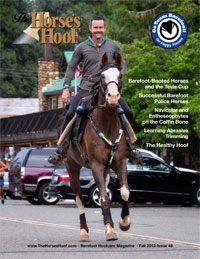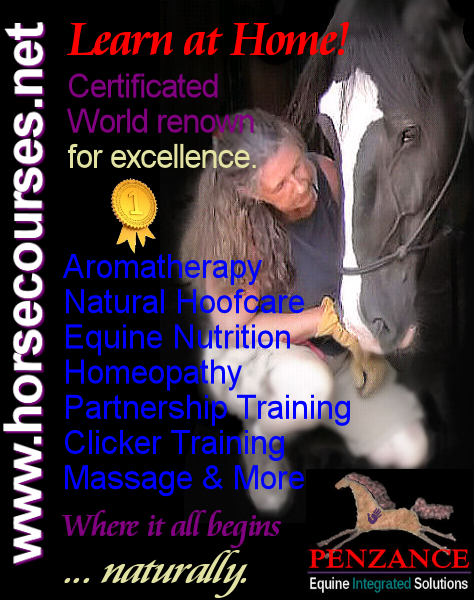 There seems to be a universal misconception about using a reward system (Clicker Training) when ‘training’ horses.
There seems to be a universal misconception about using a reward system (Clicker Training) when ‘training’ horses.
To the left you see the positive results of using a very short (20 min.) clicker training session to work with a young horse who ‘would not stand at the mounting block’.
In fact, it was told to me and others that the horse would bolt and throw its rider. (As well as need the use of a chain over his nose so he didn’t push through the handler and take off.)
… Really?
Now some said in response to the demonstration, “Well, you didn’t follow through into having someone actually mount onto his back so you failed.”
Again, Really?
To them I say, “Well, we did what was requested (to teach the horse to stand quietly at the mounting block) for the short demonstration time we had – the horse stood quietly while a strange rider climbed up the mounting block. In fact, he stood unrestrained (yes, he did — view the videos here: http://youtu.be/nItk8Rp17BE (Part 1. The work with the horse started in the latter portion of Part 3.)
He did this in 20 mins. WITHOUT the use of force and coercion aka punishment, heavy corrections.
I gave him choices. The horse CHOSE to stand at the mounting block. The horse CHOSE to follow me in the arena without any force. The horse CHOSE to be with me (he could have been resisting and pulling away, which he did for a moment or two but then CHOSE to be with me) … it was all HIS CHOICE. I did not ‘force’ him through punishment or heavy handed ‘corrections’. And, he was rewarded for his ‘correct’ choices.
(Clicker Training uses positive reinforcement to mark an exact instant of the ‘correct’ response from the horse and then rewards the horse with a reinforcer of some sort – something that will motivate and cause the horse to WANT to try to earn the reward again. Food is a primary reinforcer and, as such, sparks the spike of dopamine levels in the brain causing the horse to WANT more. The dopamine quickly becomes THE reinforcer — and the horse, as he is hardwired, will never forget what ‘earns’ him that feeling of pleasure.)
To add to this, one needs to remember that the horse isn’t a computer that simply receives thousands of megabytes of training information and then categorizes it all in order to ‘perform’. In fact, I, personally, don’t expect my horses to ‘perform’ (unless we’re doing a public demo) at all. I expect my horses to be horses. I expect ANY horse I work and play with to be a horse – nothing more, nothing less. And mostly horses just ‘want to get along’ in life – peacefully, calmly, safely.
I expect friendship from my horses. (That is, as long as I am worthy of their friendship.)
I’m not out to win a bunch of blue ribbons. Been there, done that, have the ribbons and trophies on my shelf (actually in a box in the hall closet) and not interested any more.
I’m out to “win friends and influence horses.”
I’m out to start and nurture RELATIONSHIPS of MUTUAL TRUST AND REPSECT.
OK, so trite words but think of those words in terms of PUNISHMENT and CORRECTIONS. Think of those words with relation to using whips and crops and ‘spanking’ and MAKING THE HORSE DO WHAT YOU WANT.
Do we develop close friendships with humans in that manner? OH! Wait — you say, “But we’re not dealing with humans; we’re dealing with *dangerous* horses!”
Once again, Really?
Yes, working, playing and living with horses can be dangerous. After over 45 years of doing just that, I know. But note the sentence again … “working, playing and living with horses can be dangerous.” … What can be dangerous? Horses? No — “working, playing and living with horses” … can be dangerous. Remember — horses just want to get along together and with you.
And yes. It can be dangerous working around horses and with them. . But when we take the time to understand the horse, its way of thinking, its behavioral and physical hardwiring and begin to realize that we’re REALLY working, playing and living with other spiritual beings, just like we humans are, then the connotation of that sentence above starts to make more sense.
But when we take the time to understand the horse, its way of thinking, its behavioral and physical hardwiring and begin to realize that we’re REALLY working, playing and living with other spiritual beings, just like we humans are, then the connotation of that sentence above starts to make more sense.
Do you force new friends to do what YOU want with whips, chains and other means of coercion? (Wait .. don’t go there! That’s not what I mean! *grin*) … seriously, think about it.
Do we – CAN we ‘force’ another [spiritual being/human/horse] to become a friend? Do we ‘punish’ our friends when they don’t, in our opinions, ‘behave’ the way they *should*? Or, do we ‘teach’ them, show them something new, help them get over hurdles in their lives, nurture and love and respect and trust our friends?
And then go on to an even deeper level of relationship with that person?
While Clicker Training/Target Training/Positive Reinforcement all are based on a reward system, do we not all live in a reward system? Paychecks, Hugs, Praises, Special Gifts, etc. And, the more we nurture and ‘reward’ another “friend”, the deeper the relationship becomes. The more TRUST is established. The more LOVE is developed. We learn to HONOR our friend and friendship. We CHERISH the relationship that we work so hard to cultivate.
Why would we want to PUNISH or CORRECT something unless we are thinking of only ourselves and how WE want the relationship to be? Punishment (Positive or Negative Punishment) have shown to cause “Avoidance” behaviors, “Learned Helplessness” and “Defensive” behaviors in horses (and people, too). How does it make sense to cause pain and fear to a “Friend” who is hardwired on a FLIGHT/FIGHT instinctual basis? If we cause pain or fear to a horse they’ll only want to flee AWAY from that which is causing the pain and fear (us who cause the pain and fear).
To me, that makes no sense. To the hundreds and hundreds of horses with whom I’ve worked and played over the course of over 45 years, it made no sense to them, either.
Punishment, Coercion, Painful “corrections” serve one purpose and one purpose only … to put the handler in the place of DOMINANCE.
What does that say about the handler/trainer/dominating human? Chains, Whips, Crops, Physical battering, Shanking, Twitching, Throwing to the ground, chasing to submission, etc. etc. … what do they say to you? Granted there are times in emergencies when one HAS to do what one must in order to stay safe or even to save one’s life. But to TEACH THE HORSE? Do these ‘tools’, used in the form of PUNISHMENT, really ‘teach’ the horse the lessons at hand?
The answer to that is “Well, yeah — actually they do.” …
They teach the horse to fear the handler.
They teach the horse how to avoid being hurt or frightened.
They teach the horse that if they go into learned helplessness, they won’t be hurt.
Is that really what you want? Is that what you think your horse wants?
Try asking him today what HE wants. Tuck your own ego and desires away and listen to what your heart, your gut is saying … what your HORSE is saying.
What does YOUR HORSE want today?










